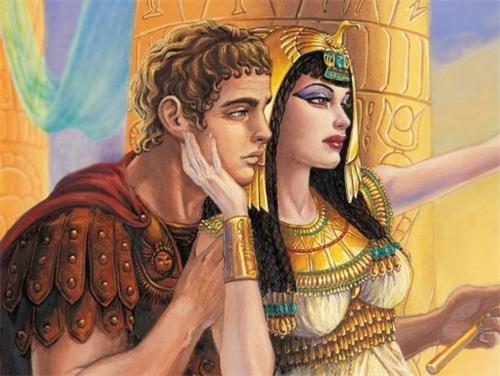
As the concluding Pharaoh of bygone Egypt, Cleopatra's moniker has indelibly become intertwined with the concepts of dominance, amorous affection, and the significant choices that shaped her destinyThe life of hers that has become the stuff of legend was fraught with unexpected changes and paradoxes. This was most evident in her convoluted associations with Julius Caesar and Mark Antony, where the dynamics of authority and love were constantly enmeshed.
Upon the passing of her father, Ptolemy XII, the youthful Cleopatra assumed the throne of Egypt, stepping into a position of great power and responsibility.However, her rule was unstable due to her younger brother, Ptolemy XIII, who was immature and inexperienced. Their escalating conflict eventually led to a split between them. Realizing that securing her throne required external support, Cleopatra turned to the most powerful empire of the time—Rome.
Julius Caesar, Rome’s great general, was at the height of his power. Seeking to solidify his rule and expand Rome’s influence after dealing with internal rivals, he saw an alliance with Egypt as an opportunity. When he first met Cleopatra, he was captivated not only by her beauty but also by her intelligence and political acumen. She skillfully demonstrated the benefits of allying with her, convincing Caesar of their potential partnership. In the end, Caesar made the determination to assist Cleopatra in toppling her brother's regime, which led to her being reinstated as the ruler of the throne.
Cleopatra and Caesar’s relationship quickly deepened, and she even became his legitimate wife, bearing him a son. For Cleopatra, Caesar was not only a lover but also a source of security and prosperity for herself and her kingdom. However, their union was short-lived. In 44 BCE, Caesar was assassinated, leaving Cleopatra without her most powerful protector. As Rome plunged into political turmoil, she knew she had to make yet another crucial choice.
Following Caesar’s death, Rome entered a period of internal conflict, with Mark Antony emerging as one of the dominant figures in the Second Triumvirate. Cleopatra decided to rely on this bold yet reckless general to secure her rule in Egypt. Using the same charm and intellect that had captivated Caesar, she successfully won Antony’s heart. Their romance flourished, and together they had three children. Antony seemed to be her new hope after Caesar’s loss, providing her with a renewed sense of stability within the Roman sphere of power.
However, with the rise of Octavian, another formidable Roman leader, Cleopatra’s position once again became precarious. The tension between them grew steadily, ultimately escalating to the point of war. As a result of this conflict, Antony suffered a catastrophic loss at the hands of Octavian.
To preserve her dynasty, Cleopatra severed ties with Antony and attempted to surrender to Octavian. Yet, Octavian showed her no mercy, confining her to a secluded palace, where she ultimately took her own life.
Cleopatra’s life was a relentless struggle between power and love. Her entanglements with two of history’s most influential men not only shaped her own fate but also altered the course of the ancient world. Her name remains etched in history, making her one of the most legendary women of all time.

Bicycle
This Bicycle Sells for $1 Million! How Do Technology and Luxury Merge on Two Wheels?
The House Of Solid Gold, an American company, has launched the world’s most expensive bicycle—named "Beverly Hills"—with a price tag of $1 million.

Edward VIII,Wallis
Edward VIII’s Choice: Surrendering the Crown for Wallis’s Warmth
In the 1930s, the turbulence within European royalty captivated the world’s attention. Among these royal dramas, one love story stood out, becoming a legend in history—the romance between King Edward VIII of Britain and Wallis Simpson.

Heathcliff,Catherine
From Orphan to Avenger: The Spiritual Entanglement of Heathcliff and Catherine
In a desolate valley, surrounded by wind and snow, stood a solitary estate—Wuthering Heights. The master of the house, Mr. Earnshaw, brought home a homeless orphan and named him Heathcliff.


